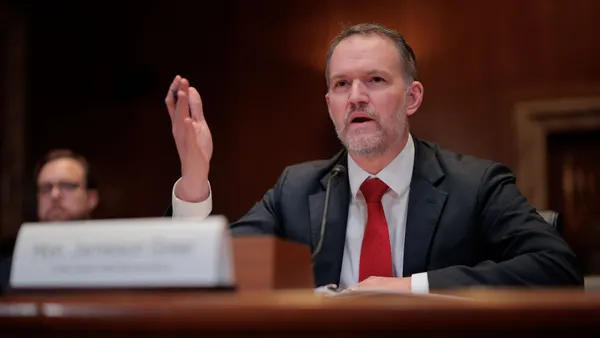Dive Brief:
- FedEx CEO Fred Smith is finalizing an alternative tax plan to serve as a counterproposal to the Republican Party's current attempts at tax reform, Bloomberg reported Tuesday.
- The GOP's plan for tax reform is stalling due to party infighting over the proposed border adjustment tax (BAT), which would act as a form of value-added tax on imports. Some representatives, and House Speaker Paul Ryan, have conceded the BAT does not currently pass muster, due in large part to industry protests.
- However, the BAT is integral to the GOP's tax reform plan, as it would raise $1 trillion over a decade to pay for many other tax cuts. Smith's plan proposes to replace the BAT altogether, increasing the gas tax, employer Medicare taxes and a 10% minimum offshore passive income tax to make up for the revenue gap, Bloomberg notes.
Dive Insight:
The border adjustment tax is a case study into the scope of influence industry leaders wield to influence public policy. Originally proposed as a means to re-balance the U.S. trade deficit through a form of value-added tax on imports, various industries have relentlessly attacked the proposal as disastrous to import-reliant supply chains.
In a recent House of Representatives Ways and Means committee hearing on the proposal, Target CEO Brian Cornell blasted the deal, arguing it would raise the retailer's tax rate from 35% to 75%, Retail Dive reports. The concern extends across the industry, so much so that 120 retailers entered an anti-BAT coalition to attack the deal as soon as the proposal was made public, and dozens have traveled to Washington to inform the administration of their opposition.
The retail industry is not alone in its opposition. Representatives from the automotive industry, and even influential Koch Industries, have publicly stated their opposition to the proposal. Global trade research firm Panjiva adds that the toy, electronics, solar panel, ammunition and agriculture industries would also be heavily impacted. A chart in a May 2017 Freedom Partners — a conservative leaning "chamber of commerce" based in Arlington, VA — report on the impact of BAT per industry highlights the scope of an import tax's impact on various manufacturing industries:
However, despite widespread opposition to the border adjustment tax, there is a general consensus that tax reform is still necessary. Just not in its current form. In the same House hearing referenced earlier, Target CEO Brian Cornell called the current tax code "broken." Speaking about the new plan, FedEx's CEO told Bloomberg he believed the current tax system was "not globally competitive," so he drafted a potential solution to ensure the window on tax reform does not close due to the BAT.
Rather than pursue a likely dead end, the new plan proposes alternative solutions. Whether FedEx's plan, when it is released, changes the political stalemate on tax reform is yet to be seen. After all, some proposals, including increased gas and offshore income taxes, are sure to raise eyebrows among the corporate world as well.














